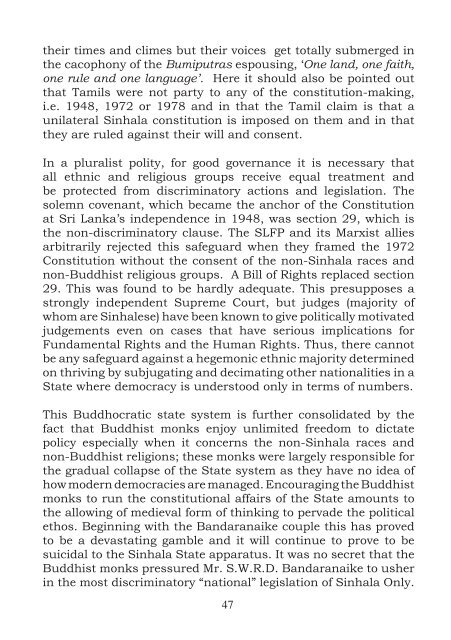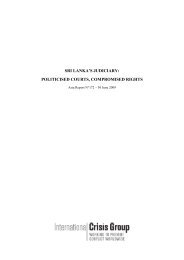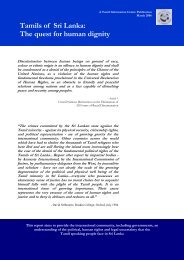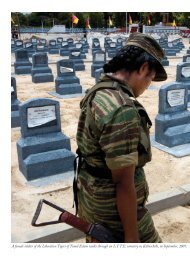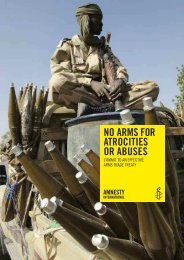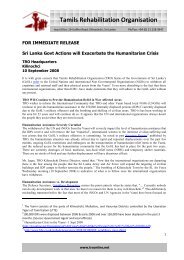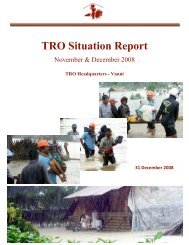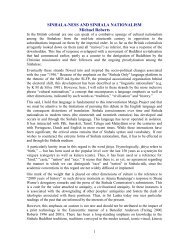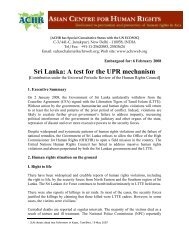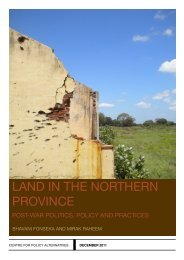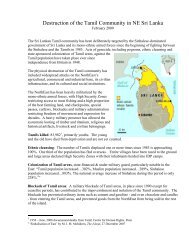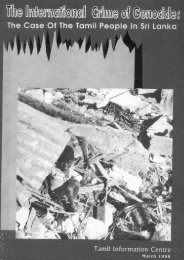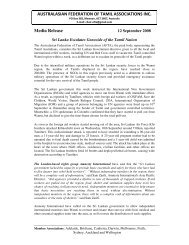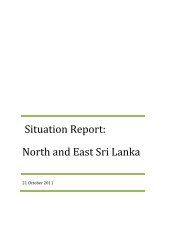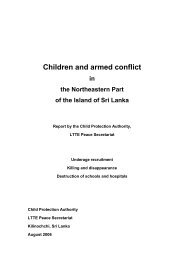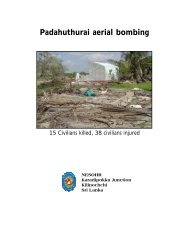The Conflict in Sri Lanka: Ground Realities - Ilankai Tamil Sangam
The Conflict in Sri Lanka: Ground Realities - Ilankai Tamil Sangam
The Conflict in Sri Lanka: Ground Realities - Ilankai Tamil Sangam
Create successful ePaper yourself
Turn your PDF publications into a flip-book with our unique Google optimized e-Paper software.
their times and climes but their voices get totally submerged <strong>in</strong><br />
the cacophony of the Bumiputras espous<strong>in</strong>g, ‘One land, one faith,<br />
one rule and one language’. Here it should also be po<strong>in</strong>ted out<br />
that <strong>Tamil</strong>s were not party to any of the constitution-mak<strong>in</strong>g,<br />
i.e. 1948, 1972 or 1978 and <strong>in</strong> that the <strong>Tamil</strong> claim is that a<br />
unilateral S<strong>in</strong>hala constitution is imposed on them and <strong>in</strong> that<br />
they are ruled aga<strong>in</strong>st their will and consent.<br />
In a pluralist polity, for good governance it is necessary that<br />
all ethnic and religious groups receive equal treatment and<br />
be protected from discrim<strong>in</strong>atory actions and legislation. <strong>The</strong><br />
solemn covenant, which became the anchor of the Constitution<br />
at <strong>Sri</strong> <strong>Lanka</strong>’s <strong>in</strong>dependence <strong>in</strong> 1948, was section 29, which is<br />
the non-discrim<strong>in</strong>atory clause. <strong>The</strong> SLFP and its Marxist allies<br />
arbitrarily rejected this safeguard when they framed the 1972<br />
Constitution without the consent of the non-S<strong>in</strong>hala races and<br />
non-Buddhist religious groups. A Bill of Rights replaced section<br />
29. This was found to be hardly adequate. This presupposes a<br />
strongly <strong>in</strong>dependent Supreme Court, but judges (majority of<br />
whom are S<strong>in</strong>halese) have been known to give politically motivated<br />
judgements even on cases that have serious implications for<br />
Fundamental Rights and the Human Rights. Thus, there cannot<br />
be any safeguard aga<strong>in</strong>st a hegemonic ethnic majority determ<strong>in</strong>ed<br />
on thriv<strong>in</strong>g by subjugat<strong>in</strong>g and decimat<strong>in</strong>g other nationalities <strong>in</strong> a<br />
State where democracy is understood only <strong>in</strong> terms of numbers.<br />
This Buddhocratic state system is further consolidated by the<br />
fact that Buddhist monks enjoy unlimited freedom to dictate<br />
policy especially when it concerns the non-S<strong>in</strong>hala races and<br />
non-Buddhist religions; these monks were largely responsible for<br />
the gradual collapse of the State system as they have no idea of<br />
how modern democracies are managed. Encourag<strong>in</strong>g the Buddhist<br />
monks to run the constitutional affairs of the State amounts to<br />
the allow<strong>in</strong>g of medieval form of th<strong>in</strong>k<strong>in</strong>g to pervade the political<br />
ethos. Beg<strong>in</strong>n<strong>in</strong>g with the Bandaranaike couple this has proved<br />
to be a devastat<strong>in</strong>g gamble and it will cont<strong>in</strong>ue to prove to be<br />
suicidal to the S<strong>in</strong>hala State apparatus. It was no secret that the<br />
Buddhist monks pressured Mr. S.W.R.D. Bandaranaike to usher<br />
<strong>in</strong> the most discrim<strong>in</strong>atory “national” legislation of S<strong>in</strong>hala Only.<br />
47


